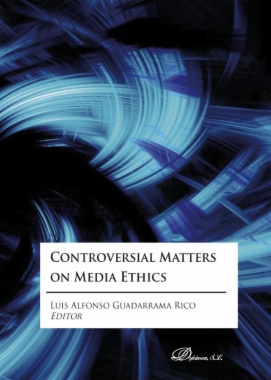In this volume, several communication researchers deal with different moral controversial issues. Communication and ethics are two faces of the same coin, because communication is just the ability of the human being to respect the equal condition of others to their right to be informed of social matters. Only when they have had right information about the public interest they can participate in their community as citizens. In this book we collected different significant contributions on communication and the main current questions of moral dilemmas.
- Cover
- Title page
- Copyright page
- Index
- Introduction Prof. Luis Alfonso Guadarrama Rico
- Organizational social responsibility in mexican commercial television María Antonieta Rebeil Corella
- 1. Introduction
- 2. Organizational social responsibility
- 3. Stakeholders Approach
- 4. The paths to OSR in commercial television enterprises
- 5. What do ethics have to do with social responsibility?
- 6. OSR or philanthropy in commercial television enterprises?
- 7. Televisa Foundation
- 8. Discussion of the nature of social responsibility in enterprises whose business is creation, making and massive distribution of cultural products
- 9. Concluding remarks
- References
- A matter of ethics?Italian advertising practitioners’ conceptualisation of gender representation Paola Panarese
- 1. Introduction
- 2. Literature review
- 3. Method
- 4. Results
- 5. Conclusion
- References
- Facebook in Egypt from a revolution icon to unethical tool among Dina Farouk Abou Zeid
- 1. Introduction
- 2. Hypothesis
- 3. Methods
- 4. Results
- 5. Conclusions
- References
- Cash and Gifts for Coverage: Bribery and Corruption of Journalism Ethics in Cameroon Peter Tiako Ngangum
- 1. Introduction
- 2. Hypothesis
- 3. Method
- 4. Results
- 5. Conclusion
- References
- Telling about war in the digital age: Media ethical reflections on new forms of war reporting and the role of recipients in new communication scenarios Nina Köberer — Marc Sehr
- 1. Introduction
- 2. Hypothesis
- 3. Methods
- 4. Results
- 5. Conclusions
- References
- Protecting privacy in social media Dr. Denitza Toptchiyska
- 1. Introduction
- 2. The concept of data controller in social media context
- 3. Data controllers in social media
- 4. Household exemption
- 5. Exemption for journalistic purposes
- 6. Balancing between the legal interests of the parties involved
- 7. Application of EU data protection legislation in social media
- 8. Regulation of social media in light of the EU Data protection reform
- 9. Conclusions
- References
- From Snowden to Google: Has EU been ready to deal with internet spy? Tossapon Tassanakunlapan
- 1. Introduction
- 2. Hypothesis
- 3. Methods
- 4. Results
- 5. Conclusions
- References
- Ethical challenges on intercultural communication Prof. Luis Alfonso Guadarrama Rico Prof. Juan Carlos Suárez Villegas
- 1. Introduction
- 2. An ethical concept of citizenship
- 3. Media speech about interculturality
- 4. The meaning of intercultural competence and The four components of intercultural competence
- 5. Intercultural learning through Mass Media
- 6. Training students of Journalism School on interculturality
- References

